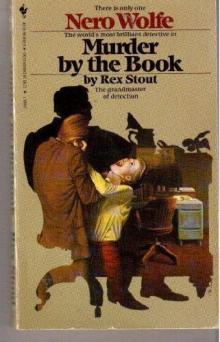Rex stout nero wolfe 2.., p.1
Rex Stout - Nero Wolfe 28 - If Death Ever Slept, page 1
part #28 of Nero Wolfe Series





Rex Stout
REX STOUT, the creator of Nero Wolfe, was born in Noblesville, Indiana, in 1886, the sixth of nine children of John and Lucetta Todhunter Stout, both Quakers. Shortly after his birth, the family moved to Wakarusa, Kansas. He was educated in a country school, but, by the age of nine, was recognized throughout the state as a prodigy in arithmetic. Mr. Stout briefly attended the University of Kansas, but left to enlist in the Navy, and spent the next two years as a warrant officer on board President Theodore Roosevelt’s yacht. When he left the Navy in 1908, Rex Stout began to write free-lance articles, worked as a sightseeing guide and as an itinerant bookkeeper. Later he devised and implemented a school banking system which was installed in four hundred cities and towns throughout the country. In 1927 Mr. Stout retired from the world of finance and, with the proceeds of his banking scheme, left for Paris to write serious fiction. He wrote three novels that received favorable reviews before turning to detective fiction. His first Nero Wolfe novel, Fer-de-Lance, appeared in 1934. It was followed by many others, among them Too Many Cooks, The Silent Speaker, If Death Ever Slept, The Doorbell Rang, and Please Pass the Guilt, which established Nero Wolfe as a leading character on a par with Erle Stanley Gardner’s famous protagonist, Perry Mason. During World War II, Rex Stout waged a personal campaign against Nazism as chairman of the War Writers’ Board, master of ceremonies of the radio program “Speaking of Liberty,” and as a member of several national committees. After the war, he turned his attention to mobilizing public opinion against the wartime use of thermonuclear devices, was an active leader in the Authors’ Guild, and resumed writing his Nero Wolfe novels. Rex Stout died in 1975 at the age of eighty-nine. A month before his death, he published his seventy-second Nero Wolfe mystery, A Family Affair. Ten years later, a seventy-third Nero Wolfe mystery was discovered and published in Death Times Three.
The Rex Stout Library
Fer-de-lance
The League of Frightened Men
The Rubber Band
The Red Box
Too Many Cooks
Some Buried Caesar
Over My Dead Body
Where There’s a Will
Black Orchids
Not Quite Dead Enough
The Silent Speaker
Too Many Women
And Be a Villain
The Second Confession
Trouble in Triplicate
In the Best Families
Three Doors to Death
Murder by the Book
Curtains for Three
Prisoner’s Base
Triple Jeopardy
The Golden Spiders
The Black Mountain
Three Men Out
Before Midnight
Might As Well Be Dead
Three Witnesses
If Death Ever Slept
Three for the Chair
Champagne for One
And Four to Go
Plot It Yourself
Too Many Clients
Three at Wolfe’s Door
The Final Deduction
Gambit
Homicide Trinity
The Mother Hunt
A Right to Die
Trio for Blunt Instruments
The Doorbell Rang
Death of a Doxy
The Father Hunt
Death of a Dude
Please Pass the Guilt
A Family Affair
Death Times Three
The Hand in the Glove
Double for Death
Bad for Business
The Broken Vase
The Sound of Murder
Red Threads
The Mountain Cat Murders
Introduction
It is now a commonplace to point out that Rex Stout fused the two great streams of English language detective fiction. In Nero Wolfe he creates a Holmesian genius, European born, who solves crimes through the application of superior intellect, in the ratiocinative tradition. In Archie Goodwin we have an American wiseacre who solves, or helps Wolfe solve, crimes through the application of superior toughness, in the hard-boiled tradition. One should not be too schematic here. Archie is smart and Wolfe is tough, but the generalization, I think, holds.
This would have been a clever contrivance in any case, but it would have been only that if Stout were not also quite a splendid writer. He wrote short and he wrote often, which tended to obscure the fact that he wrote well. Unless it leads to obscurity, brevity is rarely praised (or employed) in the journals of, ah, serious literary criticism, and frequency is often equated with frivolity. Thus it has been insufficiently observed in such circles that Stout created people you care about and want to see again. I have read all of the thirty-something Nero Wolfe novels several times. It is not the plots. The plots are ingenious enough, but Wolfe’s solutions are made to seem more remarkable than they might otherwise, because of Archie. Stout, having established Archie’s intelligence, persuades us by letting Wolfe solve crimes that Archie can’t. And while Wolfe knows many things, his genius is human behavior. He solves crimes not because he knows the symptoms of curare poisoning or the sound made by a Borneo blowgun, but because he understands what a person might do in extremis.
There are criticisms to be made. Stout was often formulaic, repeating exactly from book to book descriptions of Wolfe’s weight, for instance. The nonrecurring characters are less memorable than the regulars and seem somewhat interchangeable among the stories. And the regular characters never change. Wolfe, Archie, and the rest remain as they were in 1934, when we met them in Fer de Lance.
But these are blue-book criticisms, and the last may be, in fact, a strength. Stout’s triumph, and it is significant, is to have created a fully realized fictive world centered on the old brownstone on West Thirty-fifth Street. We return to the books to see Fritz, Theodore, Saul Panzer, Inspector Cramer, and Purley Stebbins—frozen, as it were, in a kind of furious immobility: stable and certain, and entirely believable. We know the habits of the household and take pleasure in the private order it has imposed.
And we return to the books to enjoy the company of a genius who acts like a genius. Wolfe is brilliant, learned, stubborn, lazy, tenacious, childish, conceited, fearful in small things, brave in the big ones. And in Archie he has found a Boswell worthy of his complexity and a foil worthy of the match.
One probably ought not write about the Nero Wolfe stories without remarking that only Archie’s continuing enjoyment of Lily Rowan prevents this orderly fictive world from being exclusively male. One could make much of this (scholars have made more from far less), and one might be wise to do so. But not here, and not now. It is a subject for another essay.
This essay will content itself with remembering that Stout’s achievement was to create an enduring fictional world in plenitudinous detail and to populate it with people both persuasive, compelling, and likable.
It is a sufficient achievement for any writer.
Robert B. Parker
Cambridge, Massachusetts, 1991
Chapter 1
It would not be strictly true to say that Wolfe and I were not speaking that Monday morning in May.
We had certainly spoken the night before. Getting home—home being the old brownstone on West Thirty-fifth Street owned by Wolfe, and occupied by him and Fritz and Theodore and me—around two a.m., I had been surprised to find him still up, at his desk in the office, reading a book. From the look he gave me as I entered, it was plain that something was eating him, but as I crossed to the safe to check that it was locked for the night I was supposing that he had been riled by the book, when he snapped at my back, “Where have you been?”
I turned. “Now really,” I said. “On what ground?”
He was glaring. “I should have asked, where have you not been. Miss Rowan has telephoned five times, first shortly after eight o’clock, last half an hour ago. If I had gone to bed she wouldn’t have let me sleep. As you know, Fritz was out for the evening.”
“Hasn’t he come home?”
“Yes, but he must be up to get breakfast and I didn’t want him pestered. You said you were going to the Flamingo Club with Miss Rowan. You didn’t. She telephoned five times. So I, not you, have spent the evening with her, and I haven’t enjoyed it. Is that sufficient ground?”
“No, sir.” I was at his desk, looking down at him. “Not for demanding to know where I’ve been. Shall we try it over? I’ll go out and come in again, and you’ll say you don’t like to be interrupted when you’re reading and you wish I had let you know I intended to teach Miss Rowan a lesson but no doubt I have a good explanation, and I’ll say I’m sorry but when I left here I didn’t know she would need a lesson. I only knew it when I took the elevator up to her penthouse and found that there were people there whom she knows I don’t like. So I beat it. Where I went is irrelevant, but if you insist I can give you a number to call and ask for Mrs. Schrebenwelder. If her husband answers, disguise your voice and say—”
“Pfui. You could have phoned.”
Of course that left him wide open. He was merely being childish, since my phoning to tell him I had changed my program for the evening wouldn’t have kept Lily Rowan from interrupting his reading. I admit it isn’t noble to jab a man when his arms are hanging, but having just taught Lily a lesson I thought I might as well teach him one too, and did so. I may have been a little too enthusiastic. Anyway, when I left to go up to bed we didn’
But it wouldn’t be true to say that we were not speaking Monday morning. When he came down from the plant rooms at eleven o’clock I said good morning distinctly, and he muttered it as he crossed to his desk. By the time Otis Jarrell arrived at noon, by appointment, we had exchanged at least twenty words, maybe more. I remember that at one point he asked what the bank balance was and I told him. But the air was frosty, and when I answered the doorbell and ushered Otis Jarrell into the office, and to the red leather chair at the end of Wolfe’s desk, Wolfe practically beamed at him as he inquired, “Well, sir, what is your problem?”
For him that was gushing. It was for my benefit. The idea was to show me that he was actually in the best of humor, nothing wrong with him at all, that if his manner with me was somewhat reserved it was only because I had been very difficult, and it was a pleasure, by contrast, to make contact with a fellow being who would appreciate amenities.
He was aware that the fellow being, Otis Jarrell, had at least one point in his favor: he was rated upwards of thirty million dollars. Checking on him, as I do when it’s feasible on everyone who makes an appointment to see Nero Wolfe, I had learned, in addition to that important item, that he listed himself in Who’s Who as “capitalist,” which seemed a little vague; that he maintained no office outside of his home, on Fifth Avenue in the Seventies; that he was fifty-three years old; that (this through a phone call to Lon Cohen of the Gazette) he had a reputation as a tough operator who could smell a chance for a squeeze play in his sleep; and that he had never been in jail.
He didn’t look tough, he looked flabby, but of course that’s no sign. The toughest guy I ever ran into had cheeks that needed a brassière. Jarrell’s weren’t that bad, but they were starting to sag. And although the tailor who had been paid three hundred bucks, or maybe four hundred, for making his brown shadowstriped suit had done his best, the pants had a problem with a ridge of surplus flesh when he sat.
But that wasn’t the problem that had brought the capitalist to Nero Wolfe. With his sharp brown eyes leveled at Wolfe’s big face, he said, “I want to hire you on a confidential matter. Absolutely confidential. I know your reputation or I wouldn’t be here, and your man’s, Goodwin’s, too. Before I tell you what it is I want your word that you’ll take it on and keep it to yourselves, both of you.”
“My dear sir.” Wolfe, still needing to show me that he was perfectly willing to have sociable intercourse with one who deserved it, was indulgent. “You can’t expect me to commit myself to a job without knowing what it is. You say you know my reputation; then you are satisfied of my discretion or you wouldn’t have come. Short of complicity in a felony, I can keep a secret even if I’m not working on it. So can Mr. Goodwin.”
Jarrell’s eyes moved, darted, and met mine. I looked discreet.
He went back to Wolfe. “This may help.” His hand went to a pocket and came out again with a brown envelope. From it he extracted a bundle of engravings held by a paper band. He tossed the bundle onto Wolfe’s desk, looked around for a wastebasket, saw none, and dropped the envelope on the floor. “There’s ten thousand dollars for a retainer. If I gave you a check it might be known, possibly by someone I don’t want to know it. It will be charged to expense without your name appearing. I don’t need a receipt.”
It was a little raw, but there is always human nature, and net without taxes instead of net after taxes certainly has its attractions. I thought I saw two of Wolfe’s fingers twitch a little, but the state of our relations may have influenced me.
“I prefer,” he said dryly, “to give a receipt for anything I accept. What do you want me to do?”
Jarrell opened his mouth, closed it, made a decision, and spoke. “I want you to get a snake out of my house. Out of my family.” He made fists. “My daughter-in-law. My son’s wife. It must be absolutely confidential. I want you to get evidence of things she has done, things I know damn well she has done, and she will have to go!” He defisted to gesture. “You get the proof and I’ll know what to do with it! My son will divorce her. He’ll have to. All I need—”
Wolfe stopped him. “If you please, Mr. Jarrell. You’ll have to go elsewhere. I don’t deal with marital afflictions.”
“It’s not marital. She’s my daughter-in-law.”
“You spoke of divorce. Divorce is assuredly marital. You want evidence that will effect divorce.” Wolfe straightened a finger to point at the bundle of bills. “With that inducement you should get it, if it exists—or even if it doesn’t.”
Jarrell shook his head. “You’ve got it wrong. Wait till I tell you about her. She’s a snake. She’s not a good wife, I’m sure she’s two-timing my son, that’s true, but that’s only part of it. She’s cheating me too. I’ll have to explain how I operate. My office is at my home; I keep a secretary and a stenographer there. They live there. Also my wife, and my son and his wife, and my daughter, and my wife’s brother. I buy and sell. I buy and sell anything from a barn full of horses to a corporation full of red ink. What I have is cash on hand, plenty of it, and everybody knows it from Rome to Honolulu, so I don’t need much of an office. If you know anyone who needs money and has something that is worth money, refer him to me.”
“I shall.” Wolfe was still demonstrating, to me, so he was patient. “About your daughter-in-law?”
“This is about her. Three times in the past year I’ve had deals ruined by people who must have had information of my plans. I think they got that information through her. I don’t know exactly how she got it—that’s part of the job I want you to do—but on one of the deals the man who got in ahead of me, a man named Brigham, Corey Brigham—I’m sure she’s playing with him, but I can’t prove it. I want to prove it. If you want to call that a marital affliction, all right, but it’s not my marital affliction. My marital affliction is named Trella, and I can handle her myself. Another thing, my daughter-in-law is turning my home into a madhouse, or trying to. She wants to take over. She’s damned slick about it, but that’s what she’s after. I want her out of there.”
“Then eject her. Isn’t it your house?”
“It’s not a house, it’s an apartment. Penthouse. Duplex. Twenty rooms. I own it. If I eject her my son will go too, and I want him with me. That’s another thing, she’s getting between him and me, and I can’t stop it. I tell you, she’s a snake. You said with that inducement”—he gestured at the bundle of bills—“I should get evidence for a divorce, but you don’t know her. She’s as slick as grease. The kind of man you were suggesting—one of that kind would never get her. It will take a man of your quality, your ability.” He shot a glance at me. “And Archie Goodwin’s. As I said, I know Goodwin’s reputation too. As a matter of fact, I had a specific suggestion about Goodwin in my mind when I came here. Do you want to hear it?”
“I doubt if it’s worth the trouble. What you’re after is divorce evidence.”
“I told you what I’m after, a snake. About Goodwin, I said I have a secretary, but I haven’t. I fired him a week ago. One of those deals I got hooked on, the most recent one, I suspected him of leaking information on it to a certain party, and I fired him. So that—”
“I thought you suspected your daughter-in-law.”
“I did. I do. You can’t say a man can’t suspect two different people at once, not you. So that job is vacant. What was in my mind, why can’t Goodwin take it? He would be right there, living under the same roof with her. He can size her up, there’ll be plenty of opportunities—she’ll see to that if he doesn’t. My secretary had his meals with us, so of course Goodwin will. It occurred to me that that would be the best and quickest way, at least to start. If you’re not tied up with something he could come today. Right now.”
I didn’t like him, but I was feeling sorry for him. A man of my broad sympathies must make allowances. If she was as slick a snake as he thought she was, and he should have been a good judge of slickness, he was out of luck. Of course the idea that Wolfe would consider getting along without me at hand, to be called on for anything from typing a letter to repelling an invasion in force, was ludicrous. It was hard enough to get away for week ends. Add to that Wolfe’s rule against spousesnooping, and where was he?
So I was feeling sorry for him when I heard Wolfe say, “You realize, Mr. Jarrell, that there could be no commitment as to how long he would stay there. I might need him.”

























